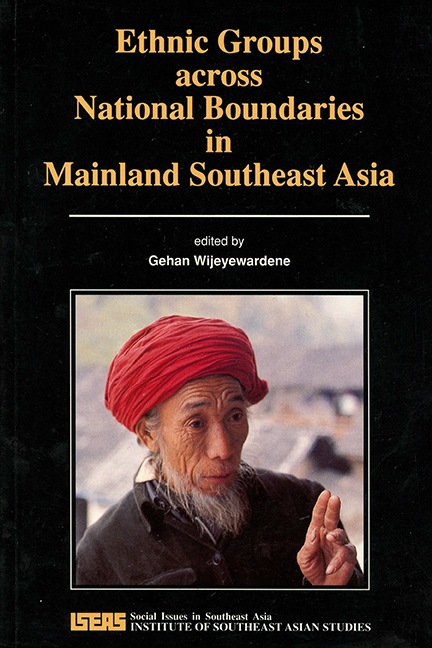Book contents
- Frontmatter
- Contents
- Foreword
- Contributors
- Acknowledgements
- 1 Introduction: Definition, Innovation, and History
- 2 Language and Ethnicity: The Mon in Burma and Thailand
- 3 Thailand and the Tai: Versions of Ethnic Identity
- 4 A Comparative Study of Structure and Contradiction in the Austro-Asiatic System of the Thai-Yunnan Periphery
- 5 Ethnicity, Nationalism, and the Nation-State: The Karen in Burma and Thailand
- 6 Capitalism and the Structure of Yao Descent Units in China and Thailand: A Comparison of Youling (1938) and Pulangka (1968)
- 7 Squatters or Refugees: Development and the Hmong
- 8 Afterword: “Ethnicity” and Anthropology
- Index
- THE EDITOR
6 - Capitalism and the Structure of Yao Descent Units in China and Thailand: A Comparison of Youling (1938) and Pulangka (1968)
Published online by Cambridge University Press: 21 October 2015
- Frontmatter
- Contents
- Foreword
- Contributors
- Acknowledgements
- 1 Introduction: Definition, Innovation, and History
- 2 Language and Ethnicity: The Mon in Burma and Thailand
- 3 Thailand and the Tai: Versions of Ethnic Identity
- 4 A Comparative Study of Structure and Contradiction in the Austro-Asiatic System of the Thai-Yunnan Periphery
- 5 Ethnicity, Nationalism, and the Nation-State: The Karen in Burma and Thailand
- 6 Capitalism and the Structure of Yao Descent Units in China and Thailand: A Comparison of Youling (1938) and Pulangka (1968)
- 7 Squatters or Refugees: Development and the Hmong
- 8 Afterword: “Ethnicity” and Anthropology
- Index
- THE EDITOR
Summary
This paper concerns Yao in two villages. Residents of both proclaim Pan Hu to be the progenitor of their ethnic group and their epics about ancestors celebrate the same culture heroes (for example, Lemoine 1987). Thousands of miles and several international borders separate these communities and there is no evidence that intercommunication has ever occurred.
Youling is in northwestern Guangdong near the junction of that province's boundaries with Hunan and Guangxi (southeastern China). Agriculturally, the Pai Yao inhabitants are lowlanders but there is good reason for their usual identification as “mountain people”: their settlement crowns the pinnacle of a massive limestone monolith which rises more than 200 metres from the surrounding waters of their irrigated fields. Their community was the subject of a social survey by a team from Lingnan (now Zhongshan) University fifty years ago (in 1938). The researchers included C.B. Lee, K.K. Lee, K.Y. Lin, and W.C. Wang. Their reports appeared in English with an introduction by Professor Reo Fortune the following year (Fortune 1939).
My puipose is to illustrate the value of that publication for analysis of information about the Yao or Iu Mien whom I studied with Dr Chob Kachananda (now Deputy Director of the Tribal Research Institute, Chiangmai) thirty years later (in 1966–68). These Iu Mien of northern Thailand were not only mountain dwellers but also highland farmers who required land at high altitudes (more than 1,000 metres) to grow opium poppy. They cultivated this and other crops in dry fields and by techniques of shifting cultivation. One of their villages was Pulangka on a ridge near the point where the boundary between Nan and Chiangrai provinces meets the international border with Laos.
The theoretical problem to which I shall relate these introductory comments concerns the development of Yao kin groups into patrilineal or bilateral descent units and arises from further observations which indicate the influence which commerce may exercise on such variance where land rather than labour is the scarce component of agricultural production or vice versa.
- Type
- Chapter
- Information
- Ethnic Groups Across National Boundaries in Mainland SEA , pp. 134 - 148Publisher: ISEAS–Yusof Ishak InstitutePrint publication year: 1990



